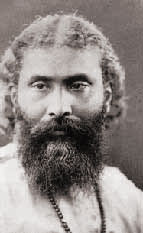Ten Sufi Thoughts
from The Way of Illumination
by Hazrat Inayat Khan
There are ten principal Sufi thoughts which comprise all
the important subjects with which the inner life of man is concerned:
1) There is one God, the Eternal, the Only Being; none else exists
save God.
2) There is one Master, the Guiding Spirit of all souls, who
constantly leads all followers towards the light.
3) There is one Holy Book, the sacred manuscript of nature, which
truly enlightens all readers.
4) There is one Religion, the unswerving progress in the right
direction towards the ideal, which fulfils the life's purpose of every
soul.
5) There is one Law, the law of Reciprocity, which can be observed
by a selfless conscience together with a sense of awakened justice.
6) There is one human Brotherhood, the Brotherhood and Sisterhood
which unites the children of earth indiscriminately in the Fatherhood of
God.
7) There is one Moral Principle, the love which springs forth from
self-denial, and blooms in deeds of beneficence.
8) There is one Object of Praise, the beauty which uplifts the
heart of its worshipper through all aspects from the seen to the unseen.
9) There is one Truth, the true knowledge of our being within and
without which is the essence of all wisdom.
10) There is one Path, the annihilation of the false ego in the
real, which raises the mortal to immortality and in which resides all
perfection.
The objectives of the Sufi path:
1) To realize and spread the knowledge of unity, the religion
of love and wisdom, so that the bias of faiths and beliefs may of itself
fall away, the human heart may overflow with love, and all hatred caused
by distinctions and differences may be rooted out.
2) To discover the light and power latent in man, the secret
of all religion, the power of mysticism, and the essence of philosophy,
without interfering with customs or belief.
3) To help to bring the world's two opposite poles, East and
West, closer together by the interchange of thought and ideals, that the
Universal Brotherhood may form of itself, and man may see with man
beyond the narrow national and racial boundaries.

Hazrat Inayat Khan (1882-1927)